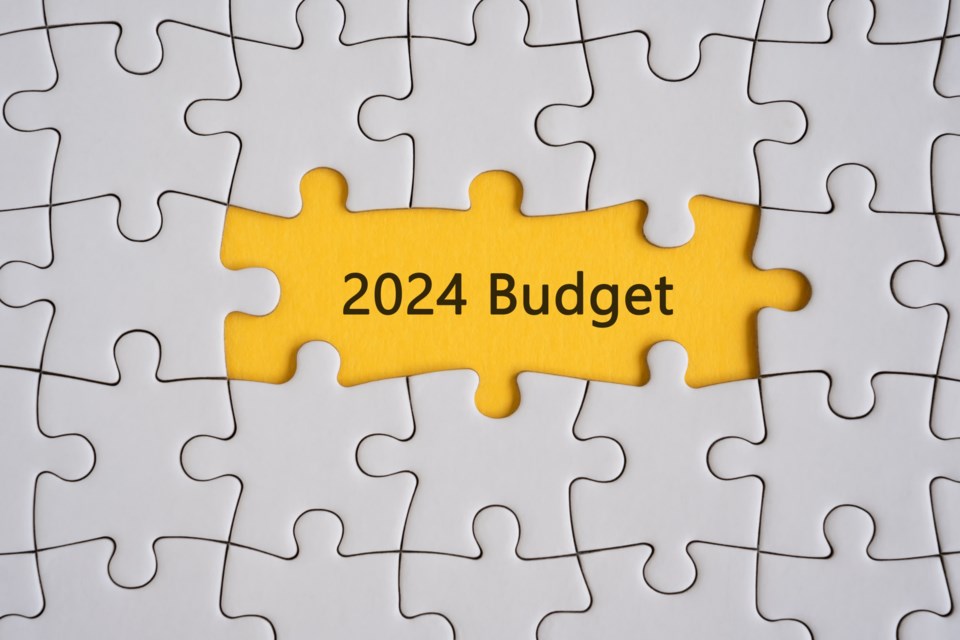The City of New Westminster has completed work its 2024 budget – and is already getting started on next year’s budget.
After months of workshops and deliberations, city council gave three readings to the 2024 to 2028 five-year financial plan bylaw at its Feb. 26 meeting. It reflects a property tax increase of 7.7 per cent in 2024.
“We’ve already started to look at the budget timeline for the 2025 budget, and we're looking to start it earlier,” said Shehzad Somji, the city’s chief financial officer. “The timeline is still getting finalized, but we're hoping to actually get the budget approved by December of 2024 so we can start early in 2025.”
Somji said the first step in next year’s budget process is public engagement, and that could begin as soon as April.
Added Lisa Spitale, the city’s chief administrative officer: “What we do every year is we bring a report to council that shows the entire process with the dates so that we're actually quite transparent.”
In a 4-2 vote, council approved three readings of the financial plan bylaw. Mayor Patrick Johnstone and Community First New West councillors Ruby Campbell and Tasha Henderson, as well as former Community First member Coun. Nadine Nakagawa, voted in support, while New West Progressive councillors Daniel Fontaine and Paul Minhas voted against the bylaw.
Fontaine expressed concern about the impact that a 7.7 per cent property tax increase will have on residential property owners and small businesses.
“I’ve heard just in the last few weeks that a couple of small businesses have either closed or are closing again, and more to come,” he said at the Feb. 26 meeting. “And we know it's a very big challenge for them – the property tax bill is a big chunk of how much they have to send over to senior orders of government.”
Nakagawa thanked staff for all the work that’s been done throughout the year to get to the stage of approving the budget.
“I think it is a difficult budget year. People are no doubt feeling pressures from a lot of places,” she said. “And while I would have liked to have had a lower number, at the end of the day – we just had a report on asset management – I think that this is a sound financial plan that is good governance and is responsible to the community going forward.”
Nakagawa put council and staff on notice that she wants to see more investments in human resources and public engagement included in next year’s budget.
“I think these are critical pieces,” she said. “We are seeing an enhancement in public engagement this year; I'd like to see more. It's a topic that comes up perpetually around the council table and in the community. But HR is something that we always feel that we can put off, and I think that that's a piece that we have to invest in at some point.”
Nakagawa voted in favour of the financial plan bylaw, but said she was “symbolically” opposing the budget for the New Westminster Police Department; she does not feel there is adequate consultation between the city and the police board about that department’s budget.
“I'll just make that point as a symbolic opposition there. I do not like the process. I've spoken about this for a number of years. I think it still needs improvements,” she said. “I’m also looking to the province to improve that process.”
How does New West compare?
Fontaine said “there’s been a lot of debate online and in the community” about a graph recently put out by the City of Port Coquitlam. That graph shows New Westminster having the second highest property taxes and utilities in Metro Vancouver, a fact he said some locals have disputed.
Fontaine said he’d like to get a report from the city’s non-partisan finance staff showing where New Westminster stands in the region in terms of its property taxes.
“Folks who live in New Westminster keep asking: do we have the second (highest) rate or not?” he said.
Fontaine said he’d like to get information from staff to “put this issue to bed for once and all” about where the City of New Westminster actually stands in terms of property taxes in the region.
It’s not the first time Port Coquitlam has made its way into discussions at New Westminster City Hall.
Council recently considered a motion from Minhas asking that the mayor request a meeting with elected officials and senior city staff from Port Coquitlam, with the goal of exploring if any of Port Coquitlam’s “best practices” regarding property taxes could be implemented locally. The motion was defeated.





